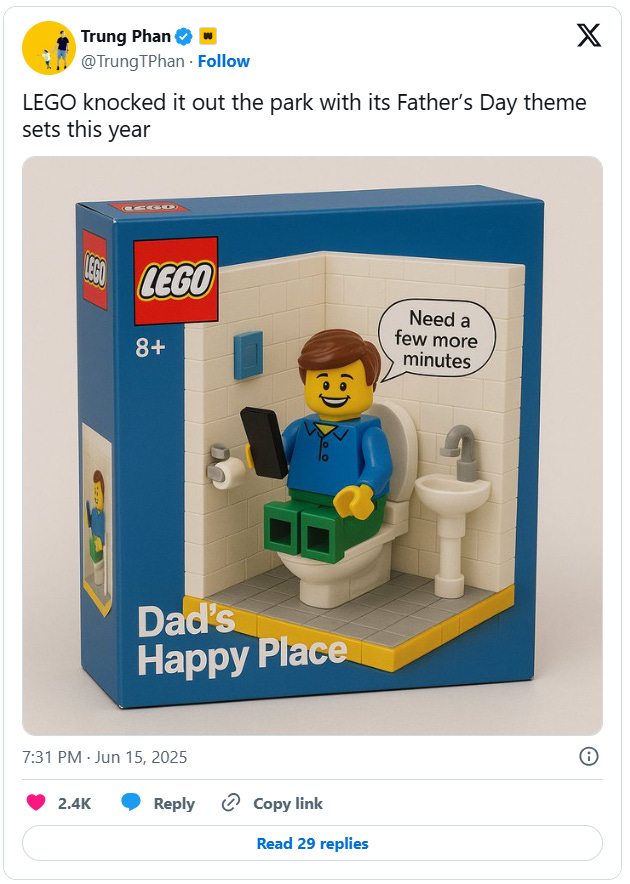Week 2025-25
We've been riding the AI hype wave for nearly three years now, yet the economic results remain elusive. That is, unless we count Nvidia's record-breaking hardware sales and the new power plants being built to meet their energy demands as tangible outcomes. @vlkodotnet
Week's Highlight: AI's Honeymoon Period Is Over
This hasn't been a particularly information-rich week for us tech-savvy folks. However, we did learn that company executives are complaining that up to half of their employees are rejecting AI adoption. Companies want to embrace AI because it's trendy, yet these same companies fail to adapt their management practices accordingly. The lack of proper training leaves employees without the necessary skills, resulting in distrust toward AI. So if you want AI in your company, simply announcing at a corporate meeting that "we're using AI from now on" won't cut it.
Microsoft CEO Satya Nadella said in an interview that if AI truly is a revolution, we should be seeing dramatic improvements in productivity and economic growth. This is quite an interesting perspective because during the industrial and computer revolutions, we clearly saw these improvements. However, those revolutions involved manufacturing physical products, which is where they made their impact. The AI revolution, in my opinion, is more of a revolution in the non-physical world. We have more virtual content. Perhaps employers hope we'll become more productive, but so far we mainly have more ways to kill time.
Business Insights
McKinsey has created the "attention equation." What is it? It's a formula that determines quality versus quantity of attention. You can deliver loads of content, but it just flows through users like water through a sieve. That's a pretty poor analogy. Let me try again. Real value is created by content that captures user attention. You might have a great TikTok/Reels video, but in that flood of content, you only get 30 seconds of user attention. One swipe and the next video is already playing. But if you're somewhere in person—at a concert or sporting event—you have the user's complete attention.
Deloitte published their 2025 UK consumer trends yearbook. For example, 47% of people use AI, but among Gen Z, it's 73%. Young people are more comfortable with AI. Everyone uses AI at work, often without their employer's knowledge. What they might not realize is that they're consuming AI-generated content to a much greater extent. The device market is saturated, and phones are only replaced when they break. 75% of people have streaming services. Interestingly, 20% of people left social media last year, and 50% started turning off notifications. Additionally, 18% set app usage limits. This is UK data, but perhaps things don't look so bad for humanity after all.
This might not fit in the business section, but Nintendo will block your Switch 2 console if you use technology for hardware emulation of their game cartridges. They won't block your account, but they'll block the console's access to their services, and if you subsequently reset it, you'll never be able to log into it again. So the Switch becomes an expensive and non-functional household item.
AI Insights
I have some quite useful AI links today. First, a simple guide on how to improve GitHub Copilot using custom instructions. How to enhance your prompts and which AI model is suitable for specific types of tasks.
You don't have to use Claude Code just for generating code. You can use it for various other purposes. For example, generating a presentation about project structure, or having it create and read you a summary of changes in your repository from the past week. The article might inspire you to create your own tool.
Nanonets-OCR is a fairly small OCR model for converting text content from images to Markdown.
Link Drop
Nxtscape is a browser that you can automate using agents. Plus, it's open-source.
Harper is an open-source alternative to Grammarly. Moreover, it can be compiled to WebAssembly, meaning it can run directly in the browser as a native add-in.
Fossify is a collection of open-source Android apps that don't send data to Google, thus protecting your privacy.
Want to take a deep dive into how Google TPU chips work? What physical architecture they built around them? It's such a specific topic that even I didn't fully understand the article's content.
Imagine waking up in the morning. If you happen to be among the small percentage of the population that remembers their dreams, then the Dream Recorder was made for you. You simply tell it what you experienced in your dream, and it not only remembers it but also generates an AI-powered visualization in very low resolution.
Closing Visual
Of course, Lego didn't actually make this set, but if they did, it would have an honored place on my desk.















